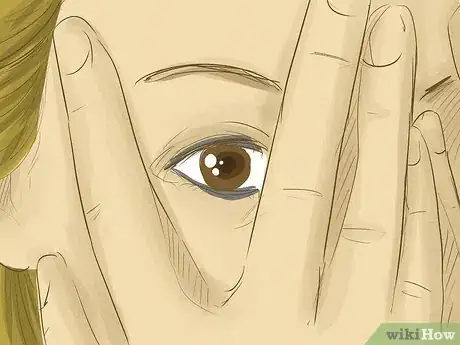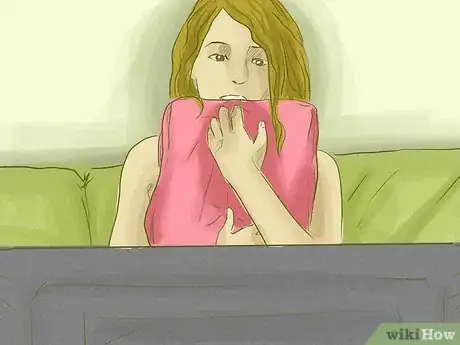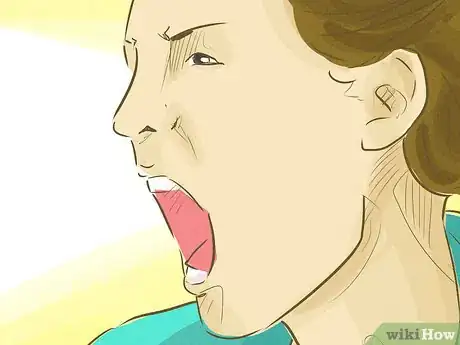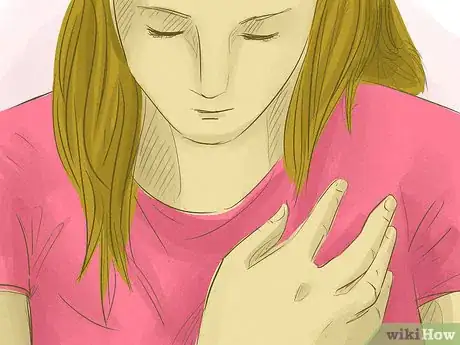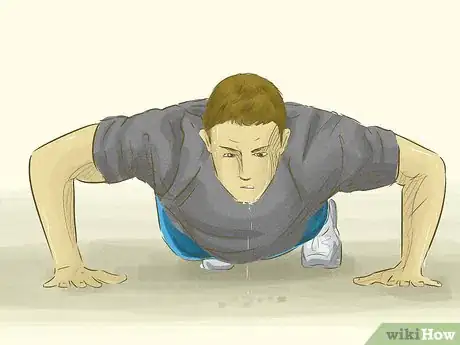This article was co-authored by Laura Horne, MPH. Laura is Chief Program Officer for Active Minds, the nation’s premier nonprofit organization supporting mental health awareness and education for students. Prior to Active Minds, Laura led public health initiatives at the National Association of County and City Health Officials and at Tulane University. She earned her Master of Public Health degree from Tulane University. She is certified as a Health Education Specialist by the National Commission for Health Education Credentialing.
There are 7 references cited in this article, which can be found at the bottom of the page.
This article has been viewed 43,090 times.
Emotions can be powerful, maybe one of the most powerful things we experience. Especially the bad ones. If you're struggling to keep your thoughts and your emotions under control, you can learn to control your mind and control your body, to make your emotional reactions, and your experience, much less severe.
Steps
Controlling Your Emotions
-
1Find what makes you vulnerable. If you feel too strongly, you need a plan to strengthen your sensitive spots. Get real about the things that affect you, the things that make you uncomfortable. What bothers you? What pushes your buttons? Consider the following questions, as specifically as possible:[1]
- What do you love the most?
- What creates the strongest feelings in you?
- What makes you cry, or feel like crying?
- What's the most beautiful thing you've ever seen? The ugliest?
- What would you like to avoid at all costs?
- What is the most important thing in your life?
- What could you never do without?
-
2Expose yourself as much as possible. Find your raw nerve. Is it a fear, an attachment, or a devotion? Whatever the case, try to expose yourself to that thing as much as possible. Give it less power in your life. Confront it.[2]
- Think of it as facing your fears. If something causes you to feel too much, you can learn to desensitize yourself to it. If you watch a hundred horror movies, the hundred-and-first will be much less scary.[3]
Advertisement -
3Take little steps. If you're scared of dogs, make a visit to the pound once a week and just be in the room with some. Pet a gentle little one when you get the chance and work your way up to taking a bigger dog for a walk. If you're scared of horror movies, start with something PG-13 and work your way up to the really graphic ones.
-
4Have a forgetting ritual. Experiencing strong emotions will help you become less affected by them. You may even start to like that hundred-and-first horror flick. And once something has less power? You've got the power to get rid of it. You've got the power to forget it.
- If you can't stop thinking about an ex who brought you great pain, look through old photos. Remembering the good times, one last time. Then create a box in your mind and burn those memories. Burn those photos.
- Treat it like a serious ritual, as silly as it may feel or sound. Say out-loud, "This is the final time that a horror movie will bother me. I will never fear another, and I never need to see another." Discard the photos for real.
-
5Put less stock in what others think. Your feelings are your own business. Listen to your own voice and your own instincts. Don't let anyone make you feel guilty for caring deeply about something. There's nothing uncool about your passions.
- Only keep friends who support you and bring positive energy, not friends who criticize or tease. If your friends don't, get new ones.
-
6Distract yourself from hard feelings. If you struggle to rein in your emotions, distract yourself with other things instead.[4] Don't control them, outrun them. If you stay more active than your emotions, you'll hardly even notice them.
- Some people may come across as cold or unfeeling, because they're drowning in work. Keep your schedule as busy as possible, your time as occupied as you can. Get busy.
- Pick up a new hobby, if you're struggling to think of things to do. Play an instrument, pick up a new sport, or take up some kind of collection. Always be active in something, working toward a goal.
Detaching from Your Emotions
-
1Be aware of your emotions. "Not feeling" doesn't mean ignoring your emotions, or repressing them. If you feel negativity, accept it. If you feel love, accept it. Strive to be fully aware and present in the emotions you experience.[5]
- Your feelings will always be a part of you on some level. Even the Dali Lama gets angry occasionally, and the toughest MMA fighter will occasionally be brought to tears. If your emotions don't rule you, you'll be calm, cool, and collected. You'll be unflappable. It's not "losing" your emotions, it's keeping them far away and under control.
-
2Name what you're feeling. The better you can learn to talk about how you're feeling, the less it will rule over your actions, without identifying yourself with it.
- As you feel a particular emotion coming on, name it: "I feel anger happening," or "There's anger here." It might sound weird, but it helps you put the emotion somewhere else.
- Don't identify with your feelings. Don't say, "I am angry." How you feel doesn't define you as a person. You're not the sum of the things you feel. You're bigger than your feelings.[6]
-
3Accept your feelings. Sometimes, you can't control your feelings. They're not things that we choose, and they're not things that we have much control over. If you're feeling scared of horror films, you're scared of horror films. If you're feeling sad about your break-up with an ex, you're sad about your break-up.[7]
- Imagine you could "watch" your suffering happen, as if it were happening to another person. Distance it, away from your conception of yourself. Put your suffering just over there.
-
4Express yourself freely. When you learn to accept your feelings, you can learn to loosen yourself up. Express yourself as freely as possible. Think of it less as "feeling" or "not feeling," and more as staying unattached to those feelings that you experience. Feel your feelings come into your mind and send them back out of your mind as easily as they arrived.[8]
- Work on thinking less about how you feel and more in just feeling it in the moment and letting it go. If something makes you mad, don't bury it under the surface. Say, "That just made me mad" and explain why.
Practicing Meditation
-
1Practice rhythmic breathing. The mind and the body are connected in ways that are difficult to understand, but your breath is often at the meeting point of that connection. Breathing deeply helps to calm emotions and settle your mind, as well as it helps to oxygenate your bloodstream, which helps to create feelings of euphoria and calmness.
- Each day, try sitting and taking deep breaths for 15-20 minutes, or more if you're comfortable and have the time. Breathe in deeply for 10 seconds, hold your breath for 5 seconds, and exhale again for 10 seconds.
-
2Exercise hard. Sometimes called "runner's high," a kind of mind-body euphoria is thought to exist when you start to push your body with strenuous exercise. While science struggles to understand the phenomenon, hypothesis have been proposed that suggest endorphins might play a role, resulting in the common description of calmness and euphoria associated with running, or other types of exercise.[9]
- Don't push yourself too hard, if you're not a regular exerciser, but try to get into shape if you want to experience this, then try challenging yourself to the "one more" game. If you're out jogging and you reach the point that you were about to stop, make yourself do one more lap, or go one more block. Do one more rep squat, or one more minute of burpees.
-
3Experiment with suffering meditation. A particular style of Buddhist meditation known as "tonglen" focuses on connecting the mind and the body around the concept of suffering. If you're interested in letting go of obsessive thoughts, of feeling less, the famous Buddhist and author Pema Chodron suggests practicing guided meditation like tonglen, to cultivate a sense of peace.[10]
- When you feel emotional discomfort, or pain, force yourself to say (or think): "Other people feel this." Your suffering is not unique. It is the suffering that others have experienced and do experience on a regular basis.
- Breathe that suffering in. Take on the burden of that suffering from others, each time you breathe, and exhale positive energy and emotions back into the world. Say, "May others be relieved of this suffering, as I take it on."
-
4Talk to your doctor if you're struggling. If you're struggling with serious emotional problems, obsessive thoughts, or are just extremely upset, consider reaching out and getting help. Not all emotional problems are controllable all by yourself. Guided therapy, prescription medication, and a variety of treatment options are available.
- If you're in serious physical pain, it's also important to discuss pain management options with your doctor. Don't suffer in silence. Try to describe your pain as accurately and honestly as possible, and seek a variety of treatment options.
Expert Q&A
Did you know you can get expert answers for this article?
Unlock expert answers by supporting wikiHow
-
QuestionHow do you distract yourself from difficult emotions?
 Laura Horne, MPHLaura is Chief Program Officer for Active Minds, the nation’s premier nonprofit organization supporting mental health awareness and education for students. Prior to Active Minds, Laura led public health initiatives at the National Association of County and City Health Officials and at Tulane University. She earned her Master of Public Health degree from Tulane University. She is certified as a Health Education Specialist by the National Commission for Health Education Credentialing.
Laura Horne, MPHLaura is Chief Program Officer for Active Minds, the nation’s premier nonprofit organization supporting mental health awareness and education for students. Prior to Active Minds, Laura led public health initiatives at the National Association of County and City Health Officials and at Tulane University. She earned her Master of Public Health degree from Tulane University. She is certified as a Health Education Specialist by the National Commission for Health Education Credentialing.
Health Education Specialist Activities are a great way for us to distract ourselves from our current emotions until we are better able to cope. When our level of distress is too high, we may not be able to effectively handle a situation and need ways to bring our emotional state down. Some good distractions include calling a friend, taking a hot or cold shower, and doing something kind for someone else.
Activities are a great way for us to distract ourselves from our current emotions until we are better able to cope. When our level of distress is too high, we may not be able to effectively handle a situation and need ways to bring our emotional state down. Some good distractions include calling a friend, taking a hot or cold shower, and doing something kind for someone else. -
QuestionHow do you change your emotions?
 Laura Horne, MPHLaura is Chief Program Officer for Active Minds, the nation’s premier nonprofit organization supporting mental health awareness and education for students. Prior to Active Minds, Laura led public health initiatives at the National Association of County and City Health Officials and at Tulane University. She earned her Master of Public Health degree from Tulane University. She is certified as a Health Education Specialist by the National Commission for Health Education Credentialing.
Laura Horne, MPHLaura is Chief Program Officer for Active Minds, the nation’s premier nonprofit organization supporting mental health awareness and education for students. Prior to Active Minds, Laura led public health initiatives at the National Association of County and City Health Officials and at Tulane University. She earned her Master of Public Health degree from Tulane University. She is certified as a Health Education Specialist by the National Commission for Health Education Credentialing.
Health Education Specialist
-
QuestionHow can I help a friend going through a hard time?
 Laura Horne, MPHLaura is Chief Program Officer for Active Minds, the nation’s premier nonprofit organization supporting mental health awareness and education for students. Prior to Active Minds, Laura led public health initiatives at the National Association of County and City Health Officials and at Tulane University. She earned her Master of Public Health degree from Tulane University. She is certified as a Health Education Specialist by the National Commission for Health Education Credentialing.
Laura Horne, MPHLaura is Chief Program Officer for Active Minds, the nation’s premier nonprofit organization supporting mental health awareness and education for students. Prior to Active Minds, Laura led public health initiatives at the National Association of County and City Health Officials and at Tulane University. She earned her Master of Public Health degree from Tulane University. She is certified as a Health Education Specialist by the National Commission for Health Education Credentialing.
Health Education Specialist
Warnings
- Stay away from angry, negative people. They will only bring stress in your life.⧼thumbs_response⧽
References
- ↑ https://www.psychologytoday.com/us/blog/anger-in-the-age-entitlement/201305/what-s-your-core-vulnerability
- ↑ https://www.psychologytoday.com/us/blog/think-act-be/201502/thinking-and-doing-in-exposureresponse-prevention-therapy
- ↑ https://www.psychologytoday.com/us/blog/behavior-briefing/202102/how-exposure-strategies-can-help-you-face-your-fears
- ↑ Laura Horne, MPH. Health Education Specialist. Expert Interview. 20 August 2019.
- ↑ Laura Horne, MPH. Health Education Specialist. Expert Interview. 20 August 2019.
- ↑ Laura Horne, MPH. Health Education Specialist. Expert Interview. 20 August 2019.
- ↑ https://www.gottman.com/blog/6stepstomindfullydealwithdifficultemotions/
- ↑ Laura Horne, MPH. Health Education Specialist. Expert Interview. 20 August 2019.
- ↑ https://www.mayoclinic.org/healthy-lifestyle/stress-management/in-depth/exercise-and-stress/art-20044469

